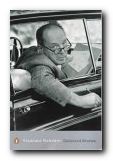a critical examination of Nabokov’s collected stories
‘A Bad Day’ (1931) is one of a pair of stories (the other is ‘Orache’) which for Nabokov are unusual in two senses. First, they have the same young boy, Peter Shishkov, as protagonist, and second they are set in pre-revolutionary Russia ‘around 1910’ (DS, p.44). The impulse behind the stories is quite clearly a combination of evoking the past and making a biographical record of a lost age. This is understandable given the prominence of personal loss in Nabokov’s life, but strangely enough the stories seem to suffer because of it.
 In ‘A Bad Day’ Peter is taken to name-day celebrations at a neighbouring estate, although he would prefer to be at home, playing alone. He tries to be co-operative with the adults he encounters, but in general he feels cut off from his surroundings. Obliged to joint other children, he is both ignored and rebuffed by them, and whilst playing hide and seek they abandon the game without telling him. He eventually rejoins them, only to be rebuffed again.
In ‘A Bad Day’ Peter is taken to name-day celebrations at a neighbouring estate, although he would prefer to be at home, playing alone. He tries to be co-operative with the adults he encounters, but in general he feels cut off from his surroundings. Obliged to joint other children, he is both ignored and rebuffed by them, and whilst playing hide and seek they abandon the game without telling him. He eventually rejoins them, only to be rebuffed again.
The reader is given every reason to sympathise with Peter throughout his boredom and his humiliation. As a character sketch it is a perfectly credible portrait of a sensitive young adolescent. He ‘did not want to hurt people’ (p.29); he behaves co-operatively even though he feels bored; he has a crush on a young girl and admires his slightly older cousin, Vasily. The children are hurtful by saying that they will not speak to him any more and accusing him of being a poseur. It is precisely for these reasons that Andrew Field sees the story as ‘a universal experience shared by all children’ (LA, p.50) and he is surely right to say that this is ‘one of the comparatively small number of Nabokov’s works which seek directly to engage the reader’s strong sympathy’ (LA,p.50).
But this is not all one might say of Peter Shishkov – for when he thinks the other children have gone on a picnic without him he plans to fake his own suicide. He
‘thought that somewhere near … there must be a lily pond and that he might leave on its bank his monogrammed handkerchief and his silver whistle on its white cord while he himself would go, unnoticed, all the way home’ (p.41).
We may not judge him severely for such self indulgence, but there is perhaps some justification for his peers calling him ‘the poseur’.
But as a composition the story has two important weaknesses. There are far too many named characters who make no contribution or have no special significance in the story. Secondly, by far the greatest amount of attention is given simply to an atmospheric and sensory evocation of what we know to be Nabokov’s own past. The journey merely to arrive at the estate occupies a quarter of the story, and almost all Peter’s actions are used as a vehicle for the sort of linguistically baroque ornamentation for which Nabokov is so well known:
‘between turns some of the players sought the bilberry jungle under the trees of the park. The berries were big, with the bloom dimming their blue, which revealed a bright violet luster if touched by beslavered fingers’ (p.35)
This degree of wordplay and alliterative ingenuity may be poetically impressive, but it seems excessive given the demands for strict significance and compression demanded by the short story as a literary form. Perhaps it belongs more properly with the chapters of biographical reminiscence which go to make up Speak, Memory.
© Roy Johnson 2005
![]() Vladimir Nabokov: The Collected Stories – Amazon UK
Vladimir Nabokov: The Collected Stories – Amazon UK
![]() Vladimir Nabokov: The Collected Stories – Amazon US
Vladimir Nabokov: The Collected Stories – Amazon US
Vladimir Nabokov web links
Vladimir Nabokov greatest works
Vladimir Nabokov criticism
Vladimir Nabokov life and works